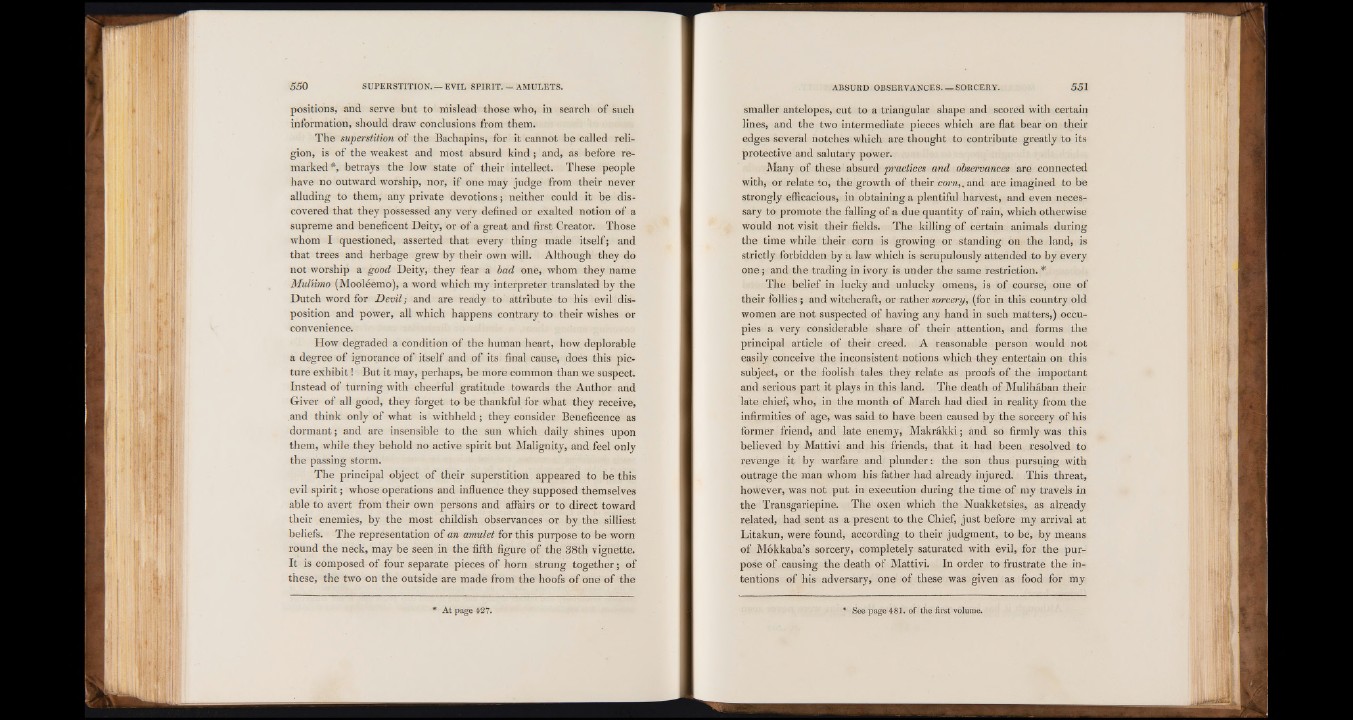
positions, and serve but to mislead those who, in search of such
information, should draw conclusions from them.
The superstition of the Bachapins, for it cannot be called religion,
is of the weakest and most absurd kind; and, as before remarked
*, betrays the low state of their intellect. These people
have no outward worship, nor, if one may judge from their never
alluding to them, any private devotions; neither could it be discovered
that they possessed any very defined or exalted notion of a
supreme and beneficent Deity, or of a great and first Creator. Those
whom I questioned, asserted that every thing made itself; and
that trees and herbage grew by their own will. Although they do
not worship a good Deity, they fear a bad one, whom they name
Muliimo (Mooleemo), a word which my interpreter translated by the
Dutch word for Demi-, and are ready to attribute to his evil disposition
and power, all which happens contrary to their wishes or
convenience.
How degraded a condition of the human heart, how deplorable
a degree of ignorance of itself and of its final cause, does this picture
exhibit! But it may, perhaps, be more common than we suspect.
Instead of turning with cheerful gratitude towards the Author and
Giver of all good, they forget to be thankful for what they receive,
and think only of what is withheld; they consider Beneficence as
dormant; and are insensible to the sun which daily shines upon
them, while they behold no active spirit but Malignity, and feel only
the passing storm.
The principal object of their superstition appeared to be this
evil spirit; whose operations and influence they supposed themselves
able to avert from their own persons and affairs or to direct toward
their enemies, by the most childish observances or by the silliest
beliefs. The representation of an amulet for this purpose to be worn
round the neck, may be seen in the fifth figure of the 38th vignette.
It is composed of four separate pieces of horn strung together; of
these, the two on the outside are made from the hoofs of one of the
smaller antelopes, cut to a triangular shape and scored with certain
lines, and the two intermediate pieces which are flat bear on their
edges several notches which are thought to contribute greatly to its
protective and salutary power.
Alany of these absurd practices and observances are connected
with, or relate to, the growth of their corn,, and are imagined to be
strongly efficacious, in obtaining a plentiful harvest, and even necessary
to promote the falling of a due quantity of rain, which otherwise
would not visit their fields. The killing of certain animals during
the time while their corn is growing or standing on the land, is
strictly forbidden by a law which is scrupulously attended to by every
one; and the trading in ivory is under the same restriction. *
The belief in lucky and unlucky omens, is of course, one of
their follies ; and witchcraft, or rather sorcery, (for in this country old
women are not suspected of having any hand in such matters,) occupies
a very considerable share of their attention, and forms the
principal article of their creed. A reasonable person would not
easily conceive the inconsistent notions which they entertain on this
subject, or the foolish tales they relate as proofs of the important
and serious part it plays in this land. The death of Mulihaban their
late chief, who, in the month of March had died in reality from the
infirmities of age, was said to have been caused by the sorcery of his
former friend, and late enemy, Makrakki; and so firmly was this
believed by Mattivi and his friends, that it had been resolved to
revenge it by warfare and plunder: the son thus pursuing with
outrage the man whom his father had already injured. This threat,
however, was not put in execution during the time of my travels in
the Transgariepine. The oxen which the Nuakketsies, as already
related, had sent as a present to the Chief, just before my arrival at
Litakun, were found, according to their judgment, to be, by means
of Mokkaba’s sorcery, completely saturated with evil, for the purpose
of causing the death of Mattivi. In order to frustrate the intentions
of his adversary, one of these was given as food for my